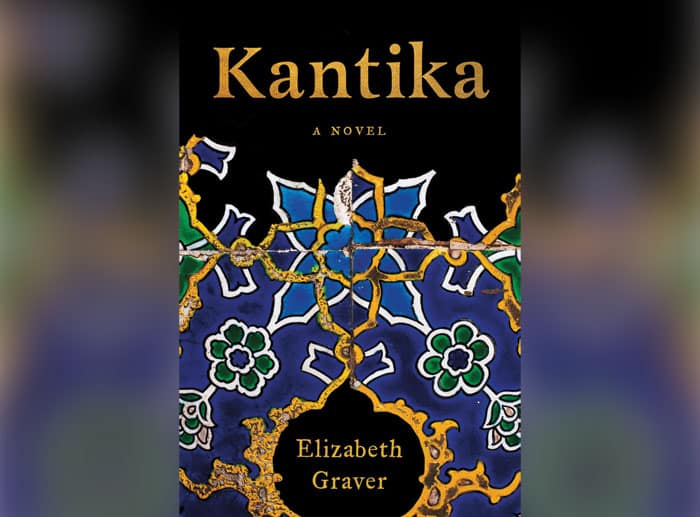
If you’ve been watching “The Beauty Queen of Jerusalem,” the romance-filled soap opera starring Israeli heartthrob Michael Aloni that tells the colorful story of a Sephardic family in the mists of a changing country (indeed, a changing world) in the first half of the 20th century, you’ll probably be as drawn to Elizabeth Graver’s latest novel “Kantika” as I was. Graver is a master at historical fiction. Her first novel, “Unravelling,” is set in mid-nineteenth century Lowell, Massachusetts amid the textile industry, and her previous novel, “The End of the Point,” which takes place on Ashaunt Point in Massachusetts Bay, offers a portrait of an affluent American family from World War II through the end of the 20th century. “Kantika,” which follows its characters through the years and across the world, is arguably far more ambitious than her previous works, and it is also, in my opinion, defter in character development than the series “Beauty Queen” or the book on which it was based.
Now, forgive me for automatically comparing “Beauty Queen” to “Kantika”; I am probably reinforcing the dominance of Ashkenormativity by suggesting all Jewish stories without Eastern European roots are actually the same story (a single, glitter-drenched unicorn). But the truth is, “Beauty Queen” and “Kantika” have a lot in common: Both are female-centered, sprawling, multi-generational novels about Ladino-speaking Jews that begin in the dusk of the Ottoman Empire and close in the English-speaking diaspora decades later. Both attempt to bring back for the reader the sights, sounds, smells, and tastes of a distant past, one that has not received a great deal of coverage in Jewish literature. So, if you’re a fan of “Beauty Queen,” if you enjoyed the novel or the series’ journey into virtually uncharted territory in Jewish culture, put “Kantika” at the top of your reading list.
You won’t be disappointed. Graver’s writing is beautiful, lyrical and the embodiment of the “kantika” — the song — of the title.
When we first meet Graver’s protagonist, Rebecca, she is singing to herself, and in a few short lines, Graver establishes the multilingual, multireligious, cosmopolitan, and yet concretely local and specific nature of Istanbul (then known as Constantinople) in 1907. “Rebecca sings to the rhythm of the oars as the boat delivers her to school, and in school with the nuns — tournez vos yeux vers Jésus — and climbing ropes at Maccabi gymnastics,” we read. “In wordless tunes, nonsense sounds and ballads, in Ladino, French and bits of Turkish, Hebrew, Greek, she sings, as on the street the lemon man sings lemons, the Bulgarian sings pudding, the vegetable man sings eggplant, squash and artichokes … [Her father] leads Rebecca to the ark [in the synagogue] … and she sings to the men below and the women above, her voice as unwavering as the cushioned freedoms and unspeakable good fortune of her childhood (still, her grandmother sews a bonjuk bead to the underside of every collar to ward off the evil eye).” We learn about Istanbul, its water-based geography, its open-air culture of buying and selling, and its intersecting communities.
We also learn about Rebecca herself: Rebecca attends a Catholic school, a sign that Jews were not insular, and also suggesting family wealth. She participates in Jewish sporting clubs, demonstrating modernity (a modernity with a space for women and girls) and communal allegiance. She speaks a medley of languages, chiefly Ladino, the Judeo-Spanish language of the Jews who were expelled from Spain during the Inquisition. She is part of a family that has standing in the Jewish community (not every man can take his young daughter up to the ark). And, despite her family’s modernity and their religious observance, she adheres to local superstitious beliefs, wearing a Turkish amulet for protection.
Graver directly addresses her reader to explain the origin story of her novel: A tape recording of her grandmother, Rebecca Levy, made in 1985. The result is the feeling that this book is authentic, a piece of transnational, century-spanning Jewish history.
Graver’s characters and no doubt many details of their stories (particularly the hard facts — the migrations, the professions, the marriages of children) derive directly from her own family history. In fact, Graver directly addresses her reader to explain the origin story of her novel: A tape recording of her grandmother, Rebecca Levy, made in 1985.
The result is the feeling that this book is authentic, a piece of transnational, century-spanning Jewish history. The real photographs of Rebecca and her family members in Constantinople in the first quarter of the century, in Barcelona in the 1920s, in Havana in the 1930s, and New York in the years that follow that front each chapter, strengthen that feeling. We navigate, through “Kantika,” a very personal history, and the family’s finances influence their transnational trajectory as much as national and international politics. I think these idiosyncrasies are a strong advantage of the novel. After all, history plays out differently for everyone.
But being beholden to the historical record, even the family one, has its challenges. Reading “Kantika,” I wanted to stay with Rebecca until the end of the novel. Her character is determined, feisty and bold. Her story is captivating. But as we move closer and closer to our own time, other voices clamor to be heard, and Rebecca’s voice gives way to her stepdaughter’s and her son’s, which alternate with Rebecca’s. I see why Graver wants to imagine the lives of her uncle and aunt; they, too, are interesting, particularly that of her Aunt Luna, who was diagnosed with cerebral palsy and struggled to live a good life in a time when disability was considered shameful and hidden away. Nonetheless, I was more curious to know what Rebecca would do next, how she would negotiate her life at each new age, in each new place, in every relationship.
My hope is that, like “Beauty Queen,” “Kantika” will land a Netflix deal. Then I can spend more time with the world that Graver has constructed, or, dare I say, resurrected. And I can see Rebecca again — and hear her sing.
Karen E. H. Skinazi, Ph.D, is Associate Professor of Literature and Culture and the director of Liberal Arts at the University of Bristol (UK) and the author of Women of Valor: Orthodox Jewish Troll Fighters, Crime Writers, and Rock Stars in Contemporary Literature and Culture.


































 More news and opinions than at a Shabbat dinner, right in your inbox.
More news and opinions than at a Shabbat dinner, right in your inbox.